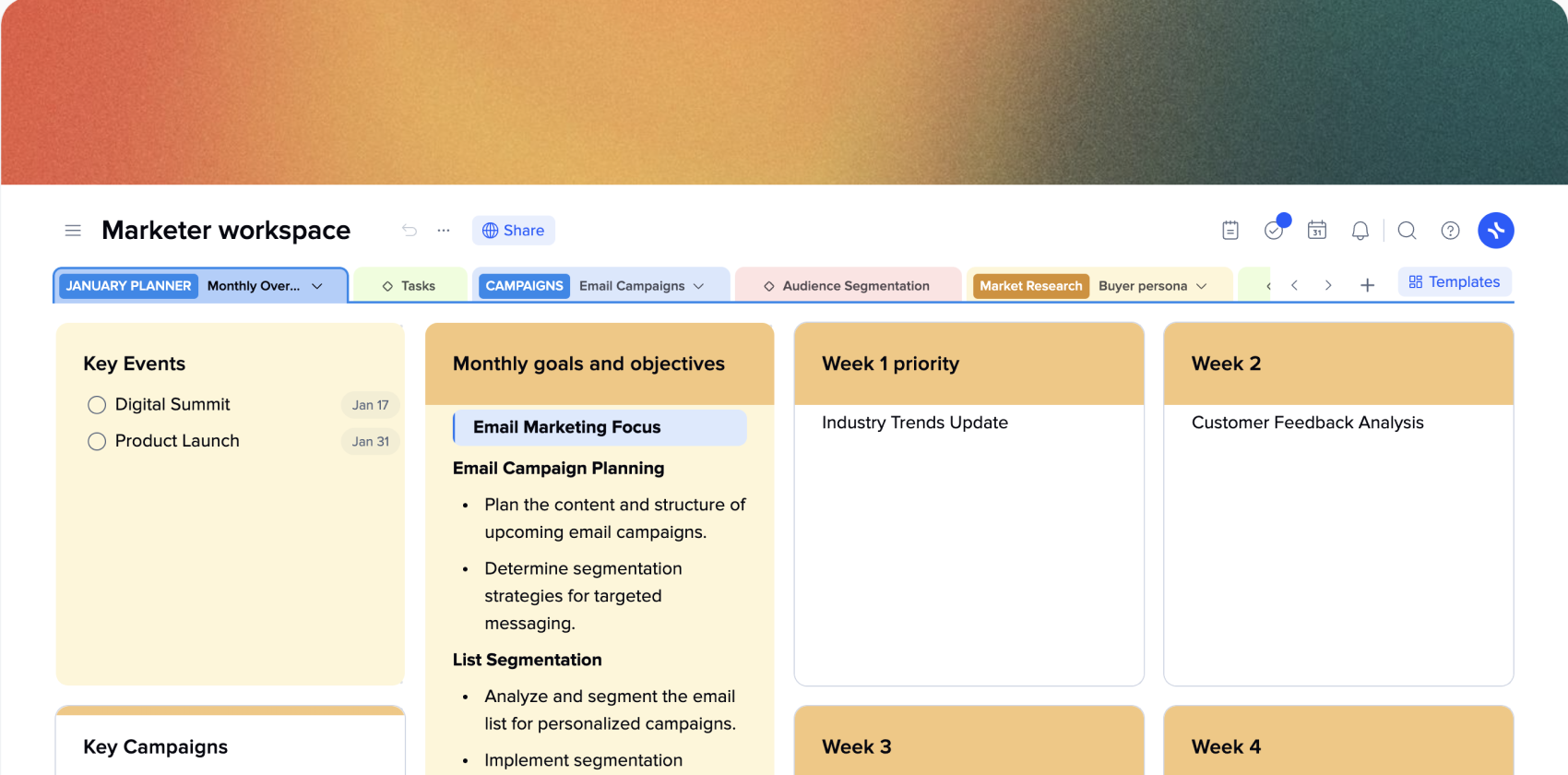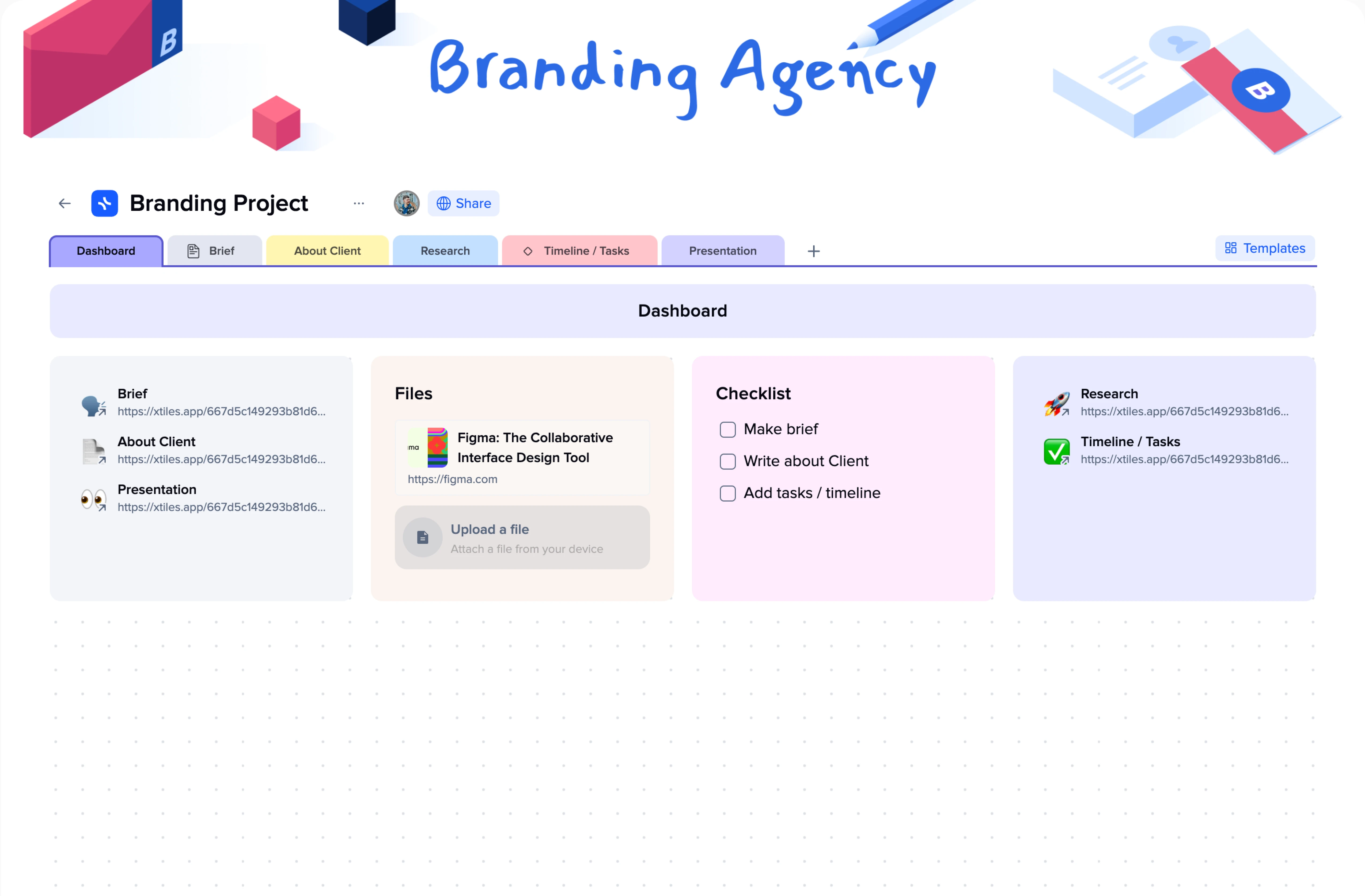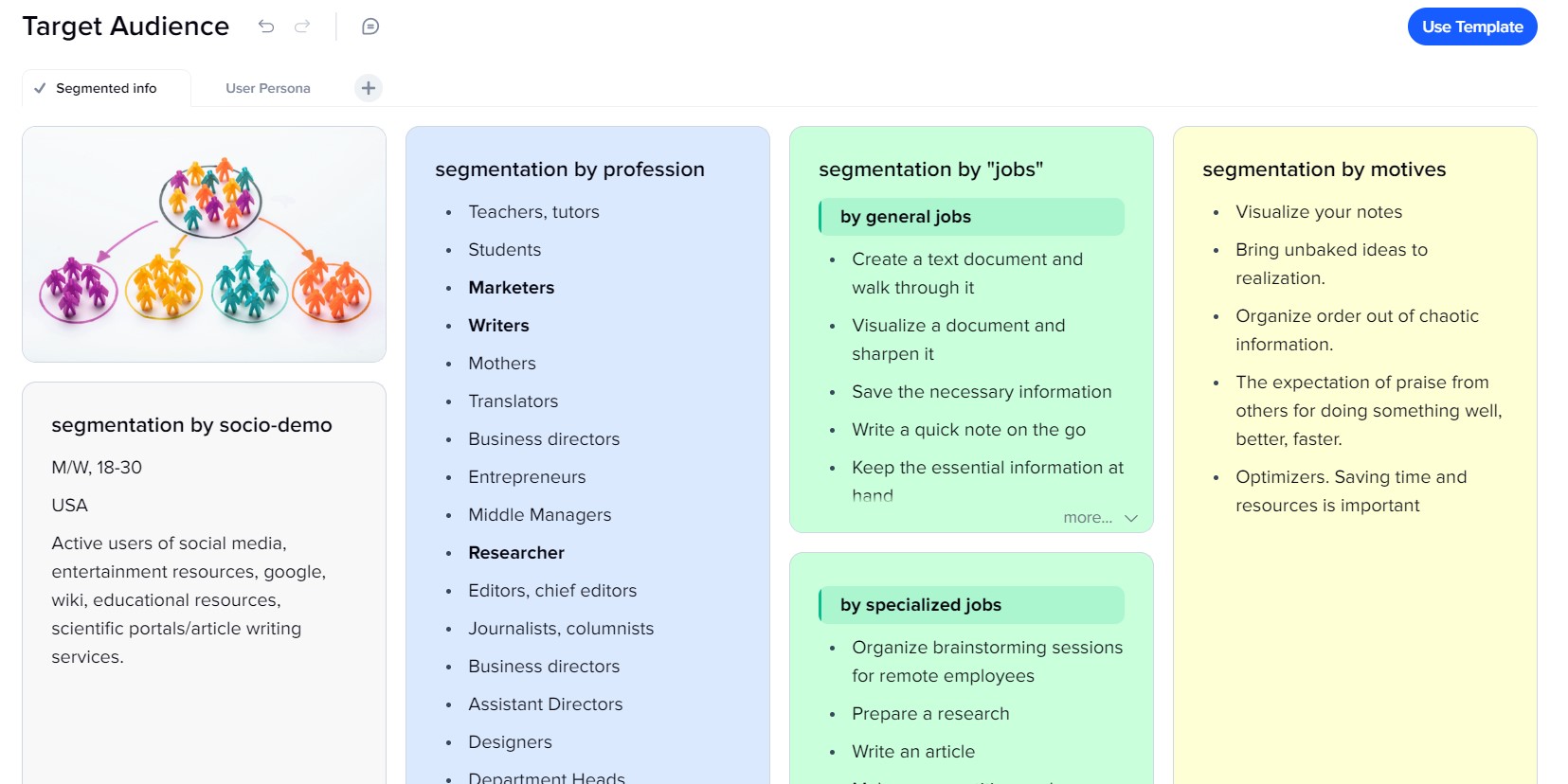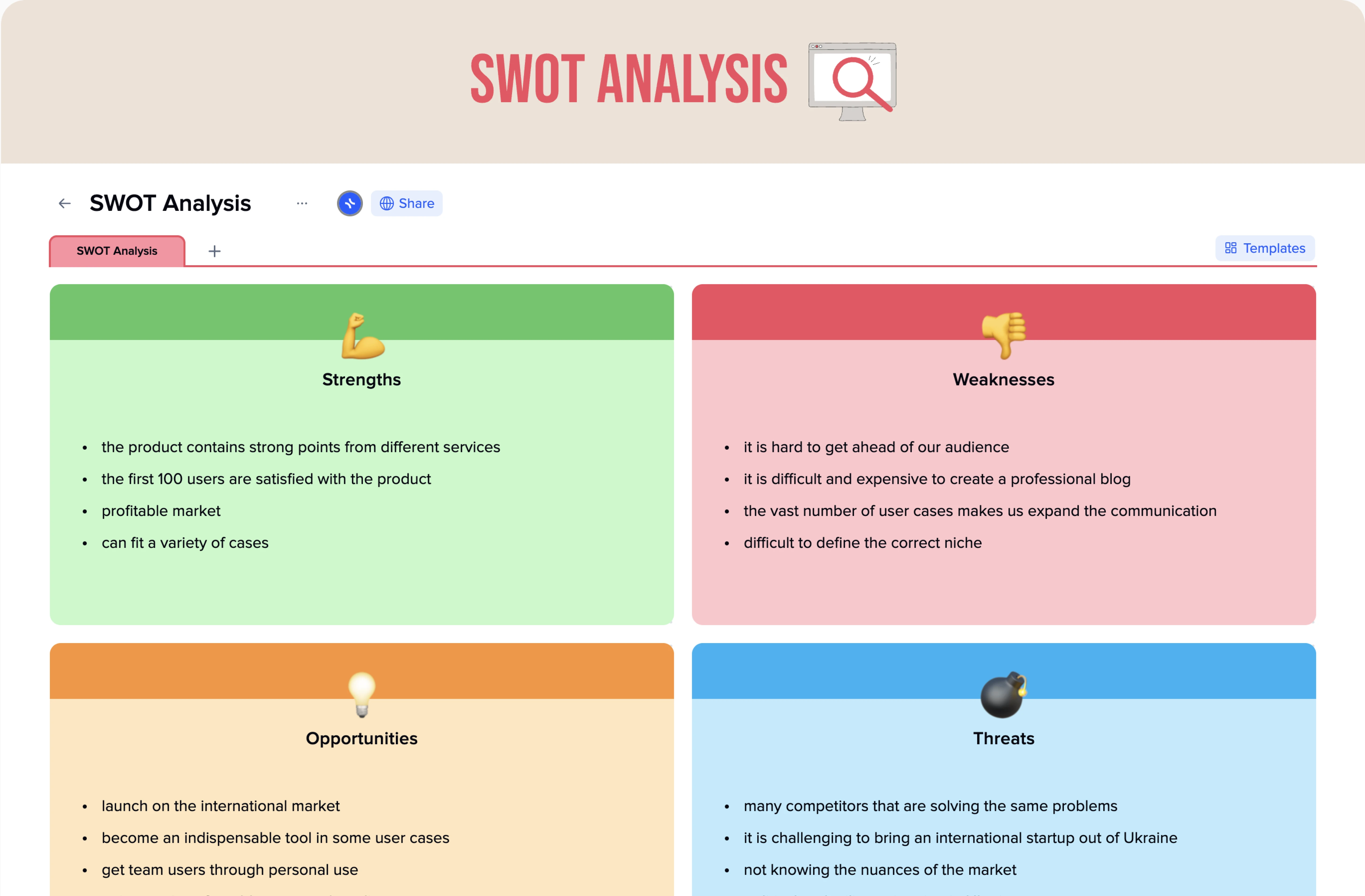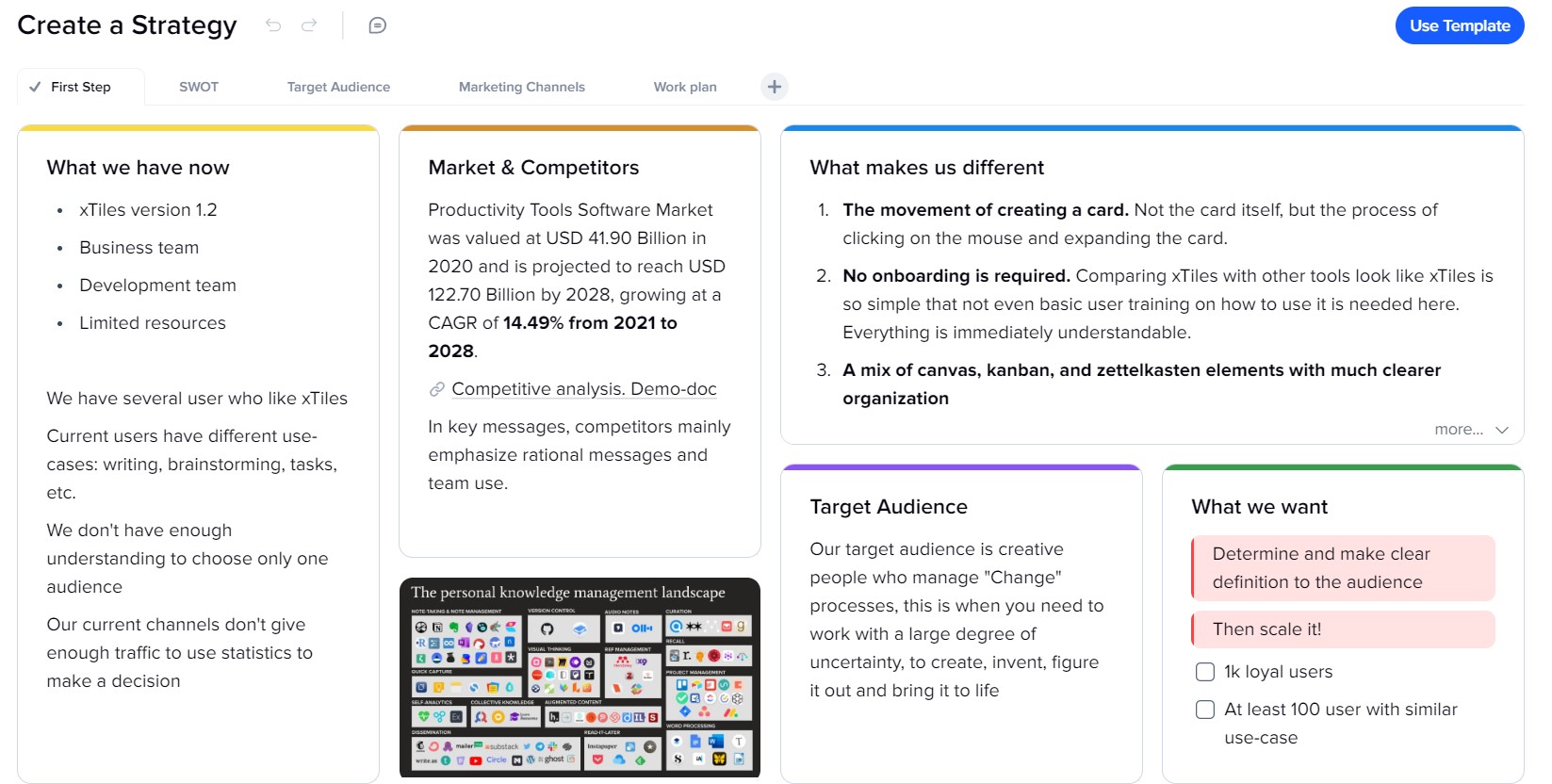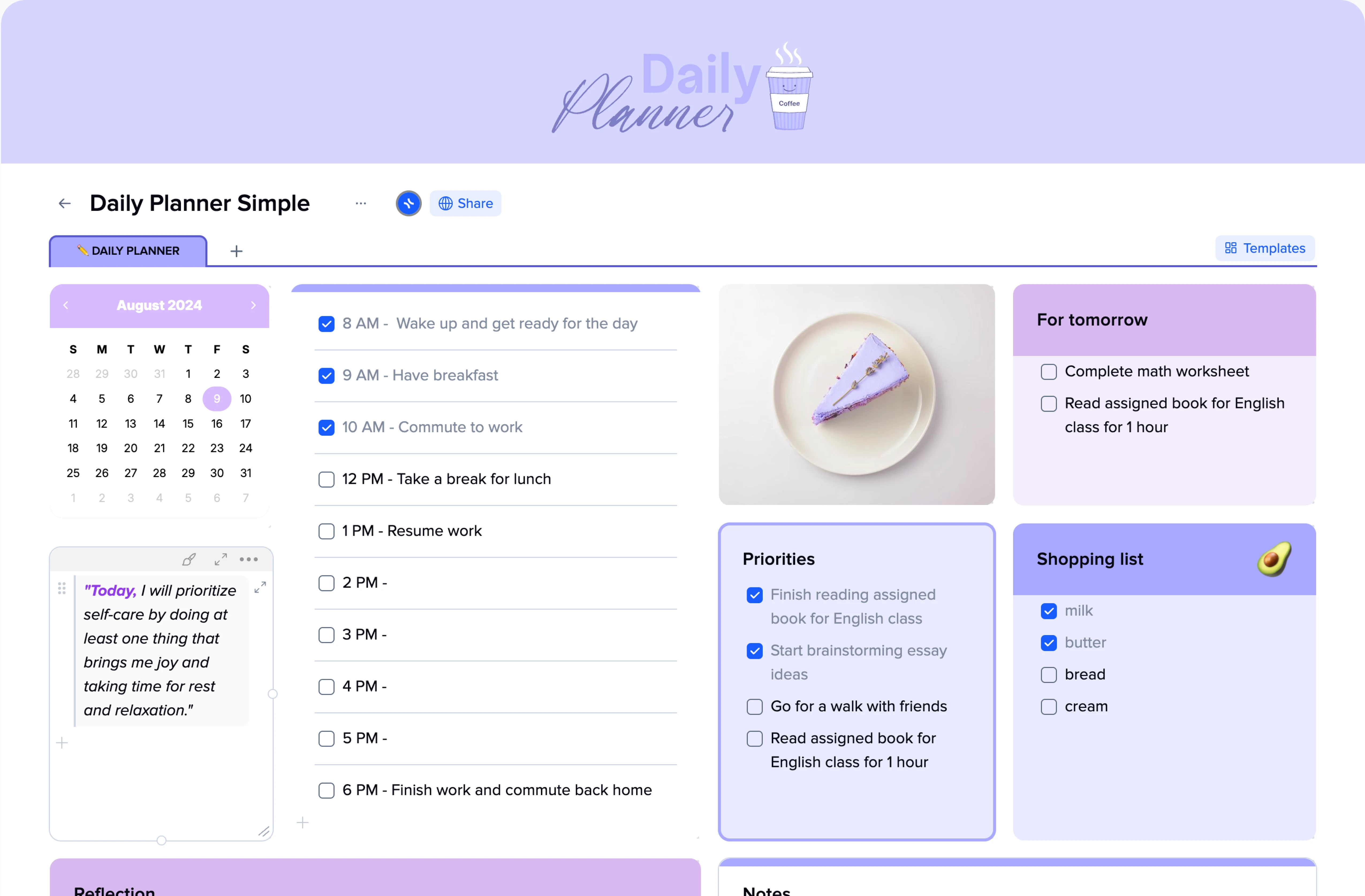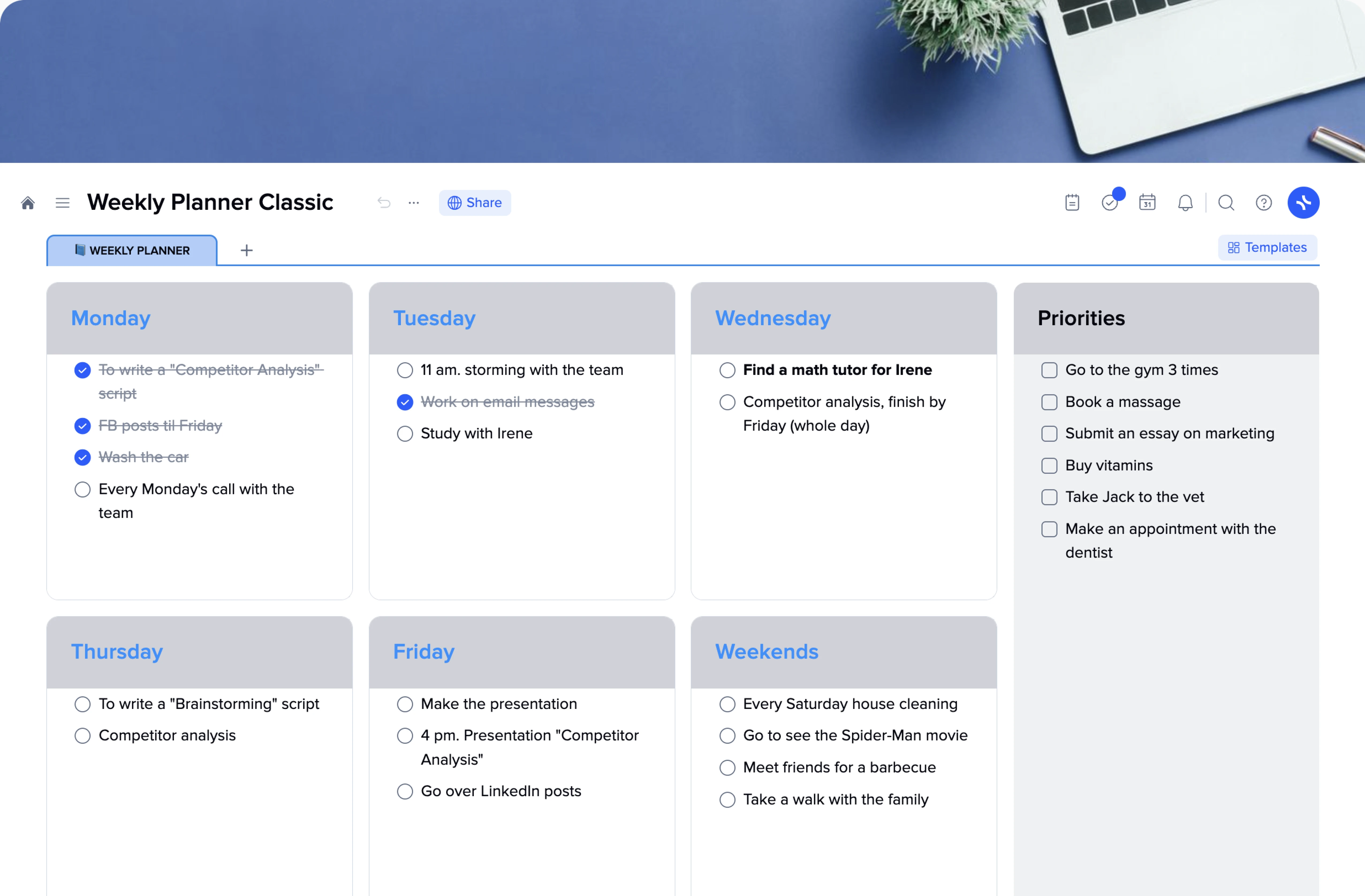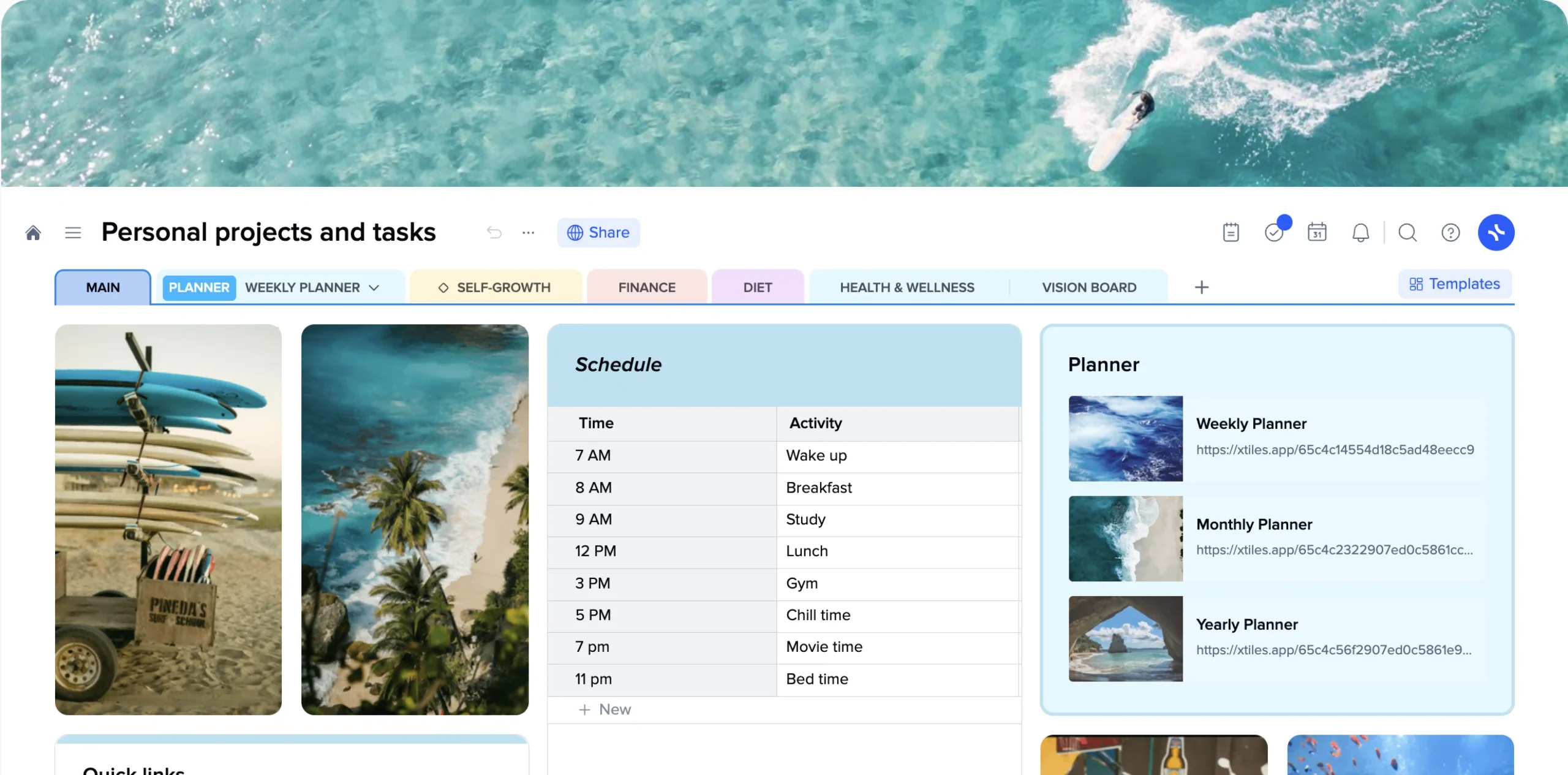Marketing project template
The path to success in marketing lies in proactive project management. Various studies show that marketers who adopt project management strategies are three times more likely to achieve favorable outcomes.
If your marketing team workflow is a total mess and your only thought is, “How to make it alive and sane through the next project?” then marketing project management in your team would use some improvement or revision. If everyone on your team is heading in a different direction, then your project management is insufficient. If you’ve lost in endless emails that lead to nothing and nowhere, if there are more meetings than a person can handle that only take your working time and leave you with nothing in the end, then your team needs to pause for a moment and think how to improve your current project management practice to deliver better results at a lower price.
Marketing project management software and templates will help you establish the process easier, make project management a part of the usual workflow without ruining someone’s habits, and coordinate your team within projects, especially if there are a few of them being executed simultaneously.
The xTiles Marketing Project Management Template offers a pre-designed framework to help teams work on their projects without missing any important details and deliver great results on time and within budget. Use it with our detailed guide on how to conduct your marketing project from start to finish to get the best possible results and provide your team with a healthy and inspirational workflow, which helps everyone achieve their best results.
What is marketing project management?
Generally speaking, marketing project management is the process of planning, overseeing, executing, and delivering marketing-related projects. It consists of many elements, stages, and methodologies, all varying depending on the team or type of the project executed. Project management for a marketing campaign will differ from the one suitable for branding, branding for a lingerie company will differ from one suitable for a pottery studio, etc.
Many people believe project management doesn’t concern them unless they are project managers. However, the whole team is a part of the project management process and its stages unless they prefer to be stuck in a chaotic workflow, being constantly distracted and unable to resolve upcoming issues without stopping the whole project.
Typically, besides a manager, management of a marketing project involves an owner or stakeholders, team lead, or head of marketing who takes charge of the process and team members who work on the project. Additionally, project management is much harder, or even impossible, without marketing project management software.
Why does marketing need project management?
By enabling transparent and logical planning and execution, project management becomes an essential aspect of marketing. It helps marketing teams to maintain control over the project’s outcome by establishing assigned stakeholders, measurable milestones, and a method to identify roadblocks.
When executed effectively, a marketing project plan empowers marketing teams to finish their tasks on time and within the allocated budget. Being a starting point for any project, it provides individuals with valuable insights into their task whenever they have doubts about whether their work aligns with the project’s goals or objectives. It becomes a reliable source of information on how the project is going on for a client who doesn’t have enough time to keep an eye on every detail, every discussion, and every brainstorming session.
Project management in marketing offers a couple of benefits for teams once they start using it on a regular basis for each of their projects:
- It simplifies the planning and execution of a project no matter its goals and nature:
Marketing campaigns require meticulous planning because every detail is important. Bad decisions regarding small tasks at the early stages of a project might have a serious impact during the late stages of the project.
Without a well-organized project management system and comprehensive marketing project management software, your hastily made decisions might become a snowball that becomes an avalanche when you are thinking about the finish. Implementing project management practices into your marketing projects can significantly ease them. With a comprehensive approach in place, transitioning from the planning stage to execution becomes more precise, increasing the chances of campaign success and saving you from the consequences of unfortunate decisions.
- It facilitates campaign tracking and evaluation:
Constant evaluation of marketing campaigns is essential to measure progress, analyze returns on investment, and identify effective strategies. One of the most important parts of project management is learning from mistakes and successes. Your previous projects are key to your future success, but only if you extract valuable lessons from them.
Teams benefit from evaluation and reflection as well since it helps to find weak points and turn them into strengths and competencies. When team members are busy with tasks and trying to meet deadlines, reflecting upon the parts they’ve finished might seem like a time-consuming distraction. However, once the project is completed, individuals might become too relaxed to think about something that isn’t relevant anymore. That’s why analyzing your resources, notes, meeting minutes, project documentation, tasks, etc., will provide a bird’s-eye view of the entire marketing campaign, making tracking and evaluation more streamlined.
- It enhances collaboration and communication within a team and beyond:
Effective collaboration and communication among marketing team members are crucial for success. Remote teams need to pay even more attention to establishing open communication and discussion within their team as many aspects become hidden for those who are separated by distances or time zones. Also, team members from different cultures might encounter difficulties in communication.
Project management fosters better chemistry and understanding among team members, providing transparency and leading to improved results from the beginning to the end of a project.
- It enables better cost tracking and budget management:
Marketing campaigns require substantial financial resources, and proper budgeting is vital to ensure smooth operations. No one would want to figure out in the middle of the journey that there’s no money to continue. That would make all the efforts and time people spend useless; some great ideas will stay unimplemented, and some people won’t get a solution to their problems, which your project might have brought them had it had enough money to be finished.
Marketing project management allows for accurate cost tracking and documentation, helping avoid overspending and utilizing every cent as effectively as possible to ensure the project and the people involved get the needed resources.
What does a marketing project manager do?
A marketing project manager’s role is multifaceted, adapting to the needs of the day and people. They are “Figaro here, Figaro there!” taking care of everything at once. An effective marketing project manager is a researcher, communicator, and marketing expert at the same time. Nevertheless, there are several key tasks that most marketing project managers commonly handle:
- They define project goals, objectives, and target outcomes:
Project managers play a crucial role in clarifying the purpose and necessity of a marketing campaign. They ensure that marketing pushes are not driven solely by impulse but are instead aligned with specific outcomes.
- They research best practices and tactics for marketing projects:
Marketing project management involves dealing with numerous variables. PMs bring order to the chaos by defining the scope of work and project budget. They meticulously plan the details concerning tactics, duration, and necessary tools to execute the project successfully.
- They organize people and resources to get a project moving:
Project managers need to be proactive and attentive to maintain project schedules. Project managers often liaise between clients, C-level executives, and marketing teams to ensure seamless project execution. One of their key responsibilities is providing clear instructions to project participants, setting deliverable deadlines, engaging with collaborators and stakeholders, and establishing transparent expectations.
- They oversee projects once they’re in progress:
Meeting project deadlines within budget is probably the most important task for a project manager that is relevant across different fields and industries. They use different techniques to make this task come true.
Additionally, they must manage client expectations effectively, ensuring they align with the project’s potential.
Regular meetings, check-ins, and progress summaries constitute a significant portion of a manager’s schedule, enabling them to monitor project progress and make necessary adjustments to achieve successful outcomes.
What are 5 stages of marketing project management, and how to conduct each of them using the xTiles Marketing Project Management Template?
Phase 1: Planning
During this initial phase, key project stakeholders collaborate to define and agree upon the project goals and objectives. Clear goals are crucial for establishing a project’s workflow.
A project manager’s main task during this initial stage is ensuring these tasks are manageable. By accepting tasks that can’t be finished under the given circumstances or budget, a manager plays a cruel joke with a team that will be working on a project and themselves who will be responsible for delivering the outcome that can’t be delivered in the first place.
The project manager plays a vital role in breaking down projects into manageable goals, objectives, and deliverables. A project charter is created, which serves as a blueprint for the project, ensuring alignment among all stakeholders.
If the goals were set without taking into account all aspects and current circumstances, it might render all the next phases of the marketing project management irrelevant. How far into the project do teams usually realize that something is wrong? It depends on many factors. However, being a project manager is also about being very realistic and level-headed or even grounded to avoid the euphoria that unreasonable optimistic ideas might bring.
Phase 2: Organization
With clear and achievable goals set, the team can establish the project’s budget and identify the deliverables. When the first stage is thoroughly thought out and discussed, you can move into the next ones with peace of mind. There’s little to be afraid of. Besides, it’s impossible to avoid all potential issues that a team might encounter throughout the project.
A detailed marketing project plan consists of multiple tasks that need to be executed. They may be grouped depending on the aspects and parts of the project. For example, visual components stay apart from textual content, and so on. It’s important to mark or separate the tasks if there are dozens of them to ease navigation throughout the project’s documentation.
You may divide the whole project into a couple of big steps, which, in their turn, will contain smaller tasks. Depending on the specification of your project, they may be executed simultaneously or sequentially.
All the tasks you set need to be allocated to team members based on their expertise and availability. Sometimes, leaving the choice to a team might cause disagreements, and tasks might not be assigned to the most skilled team members. That’s why it’s important to evaluate who will be better to perform each task on your own and be willing to make tough decisions when distributing tasks.
Phase 3: Execution
This phase marks the implementation of the project plan. Its duration depends on many factors, such as the budget, client preferences, the number of workers, etc. However, it has to be discussed before you start so that everyone has realistic expectations.
Project leaders outline task management expectations, track task progress, take necessary action to address any issues that arise along the way, and try to prevent potential issues and risks. Basically, a project manager helps guide the team to success, much like helping little turtles safely reach the water.
Visual tools like Kanban boards are employed to monitor the team’s progress, providing an easy-to-grasp overview of the campaign stages. Kanban boards enhance accountability and autonomy among team members, allowing them to work efficiently without excessive oversight.
Aside from using Kanban boards, teams can employ a variety of other approaches and techniques to achieve the desired results. You can integrate them directly into your xTiles Marketing Project Management Template or further enhance the process by creating additional documents or using other templates.
Phase 4: Control
As the project progresses, monitoring its status and addressing any potential delays or obstacles is essential for smooth execution and on-time delivery. To be honest, this is a phase that is there always, whether you have your first meeting with stakeholders or whether you evaluate your work after successful completion.
Project managers must ensure that team members are meeting deadlines and finishing their assigned tasks using all of their talent and skills, enabling seamless communication at all times. It’s important to keep an eye on your team to inspire those who still perform their tasks without enthusiasm and help those who put in too much to stay on track and avoid burnout. By providing a comprehensive platform for updates, task assignments, and adjusting due dates when needed, a project manager helps all team members stay aligned throughout the whole project.
Project managers act swiftly to identify and intervene in case of any deviations from the plan. They are everywhere, yet they are not too nosy to scare people or make them feel uncomfortable about what they do.
Phase 5: Delivery
The final phase involves the project’s culmination, which always varies depending on its nature, scope, and participants. You help your project get ready for entering the big world. This is where you make the final touches, address all the issues that have arisen (even those everyone left behind hoping someone else would resolve them or figure something out), and try to keep everyone’s focus on the project, even though they may be tired, bored, or exhausted after a long period of dedicating themselves to one project.
Delivery occurs when the project is successfully handed over to the commissioning stakeholder. However, in the case of retainer-based projects, an evaluation process takes place, encompassing client feedback and internal analysis. Tools like the xTiles Marketing Project Management Template facilitate the assessment of project timing, budget, and individual team member performance, enabling teams to define success and glean insights for future projects.

